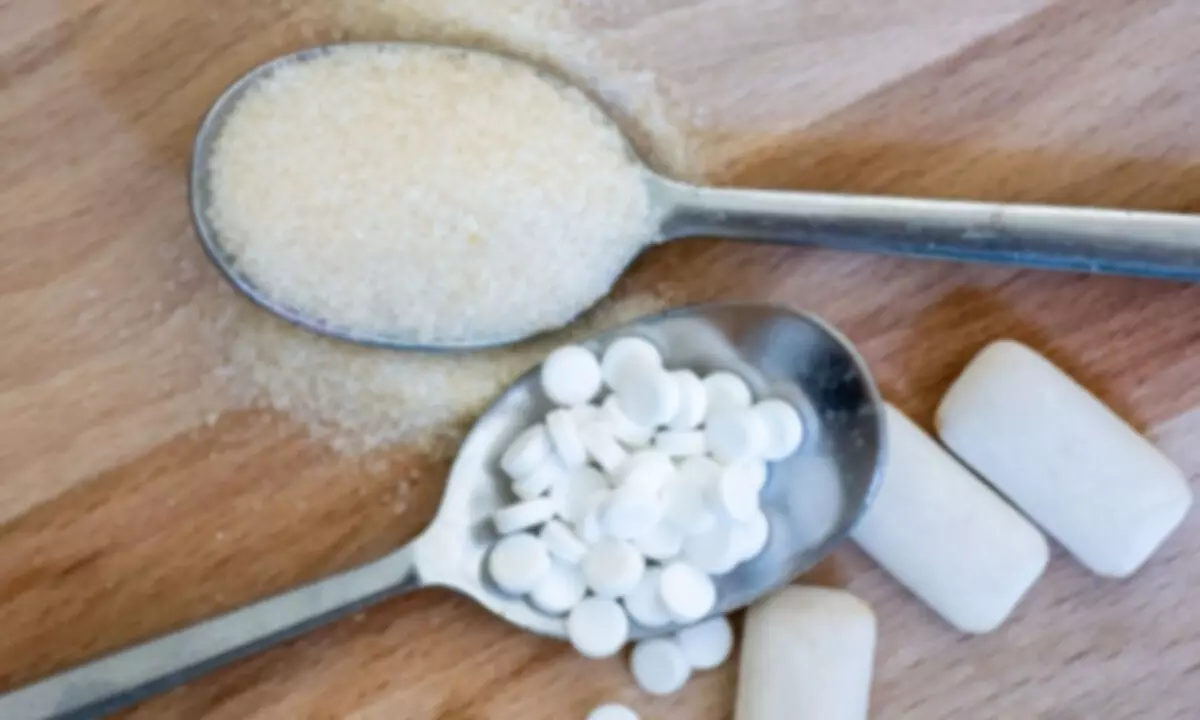Doctors advise people using aspartame not to panic
Share :

Representational image
Amid the conundrum on aspartame by the World Health Organisation (WHO), doctors on Friday advised people using the popular artificial sweetener to not panic as the evidence of it being a possible cancer causing agent is very low.
New Delhi: Amid the conundrum on aspartame by the World Health Organisation (WHO), doctors on Friday advised people using the popular artificial sweetener to not panic as the evidence of it being a possible cancer causing agent is very low.
Aspartame is an artificial (chemical) sweetener widely used in various food and beverage products since the 1980s, including diet drinks, chewing gum, gelatin, ice cream, dairy products such as yoghurt, breakfast cereal, toothpaste and medications such as cough drops and chewable vitamins.
While evidence on the chemical being a potential for cancer has been low, the WHO’s International Agency for Research on Cancer (IARC) on Friday said aspartame should be added to the list of potentially cancer-causing substances.
However, soon after, the global health body’s Joint Food and Agriculture Organisation/WHO Expert Committee on Food Additives (JECFA), said there was no reason to change guidance.
The JECFA also recommended that a person can safely consume up to 14 cans of diet drink a day.
But is there a definite link?
“There is no need to panic and just abandon aspartame completely. There is no real proof cited in this study and the WHO is also very circumspect in its actual recommendation and side by side, there's another WHO recommendation that's come that sets the bar of consumption at very high levels," Dr. Ambrish Mithal, Chairman, Endocrinology and Diabetes, Max HealthCare, told IANS.
"So the kind of levels they are permitting are actually usually much more than what an average person will consume,” he added.
The IARC classified aspartame as possibly carcinogenic to humans on the basis of limited evidence for cancer in humans (specifically, for hepatocellular carcinoma, which is a type of liver cancer).
There was also limited evidence for cancer in experimental animals and limited evidence related to the possible mechanisms for causing cancer, the WHO said in a statement.
“Definitely cancer producing evidence is very low. If the evidence is very strong, it should be banned, as why should you take anything which produces cancer. But if the evidence is not strong, to label something as carcinogenic puts a lot of fear in people's minds,” Dr V. Mohan, chairman of Dr Mohan’s Diabetes Specialities Centre, told IANS.
“I don't know how much damage this will produce psychologically because of the word ‘cancer’,” he said.
Meanwhile, the JECFA concluded that the data evaluated indicated no sufficient reason to change the previously established acceptable daily intake (ADI) of 0-40 mg per kg body weight for aspartame.
The committee, as well as the doctors reaffirmed that it is safe for a person to consume within this limit per day.
“Overall risk (of aspartame) is very low if consumed within the prescribed limits. No need for panic if you are using aspartame,” Dr Mohan wrote on Twitter.
“It is ok to have aspartame within recommended limits,” added Dr Abby Philips, a hepatologist, popularly known as the liver doctor, on the microblogging site.
Dr Mithal told IANS that “the WHO guidelines do not apply to those who already have diabetes and have to avoid sugar. There is not much benefit in terms of weight reduction, or preventing diabetes. But if someone is taking small amounts, it's okay”.
He however, recommended people to avoid products labelled as “sugar-free and containing no added sugar” because these are “very often loaded with these sweeteners and with uncertain amounts”.
“If you can avoid it, avoid it, of course you can have something without sugar or without the thing that is good,” Dr Mohan told IANS.













